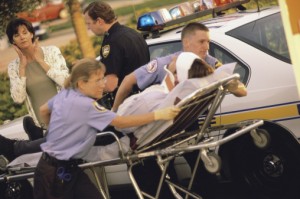In 2007, three individuals were killed in Newark, New Jersey in an incident which has now been labeled the Newark School Yard Shooting. It is the job of a personal injury attorney to determine if anyone, other than the criminals, are responsible for someone’s injury as a result of a criminal act. 
The New Jersey Tort Claims Act has several relevant sections to this inquiry. N.J.S.A. 59:5-4 provides that “Neither a public entity nor a public employee is liable for failure to provide police protection service, or if police protection service is provided, for failure to provide sufficient police protection service.” This section of the Tort Claims Act has been construed as a “broad” immunity. Rodriguez v. N.J. Sports & Exposition Authority, 193 N.J. Super. 39, 43 (App. Div. 1983). Courts have held that a public entity is not liable in tort for its failure to protect against the criminal propensity of third persons. Weuthrich v. Delia, 155 N.J. Super. 324, 326 (App. Div. 1978).
Plaintiffs have sometimes tried to argue that criminal acts of third parties are a “dangerous condition” within the meaning of N.J.S.A. 59:4-1. However, courts have held that a “dangerous condition” refers only to “the physical condition of the property itself and not to activities on the property. Levin v. County of Salem, 133 N.J. 35, 44 (1993); Sharra v. City of Atlantic City, 199 N.J. Super 535, 540 (App. Div. 1985) citing Rodriguez v. N.J. Sports & Exposition Authority, 193 N.J. Super. 39 (App. Div. 1983). Therefore, “Dangerous Conditions” has thus been found not to include the reasonably foreseeable negligent or criminal activities of third persons that have caused plaintiff’s injury. Sharra v. City of Atlantic City, 199 N.J. Super 535, 540 (App. Div. 1985); Setrin v. Glassboro State College, 136 N.J. Super. 329 (App. Div. 1975). A Dangerous Condition theory only works where the dangerous condition of property may be found to exist when an unreasonable risk of harm is created by the combination of a defect in the property and the acts of third parties.” Roe v. N.J. Transit Rail Operations, 317 N.J.Super. 72, 74–75, (App.Div.1998), certif. denied, 160 N.J. 89, 733 A.2d 494 (1999).
In Setrin, a college student was stabbed by another student at a college basketball game. Plaintiff brought an action against the college for lack of security. The Appellate Division held that the college was not liable in tort for failure to protect against the criminal propensity of a third person on its premises rather than a physical defect thereon. Thus, New Jersey cases seem to require a physical characteristic contributing to the criminal acts of a third party, such as a gate that was not properly closed or locked.
Here at Ginarte Gonzalez Winograd L.L.P., we provide high-caliber representation to New York / New Jersey personal injury victims and their families. Contact our office at 1 (888) GINARTE for free consultation and we will make sure your rights are not lost. You can also use our online contact form.
